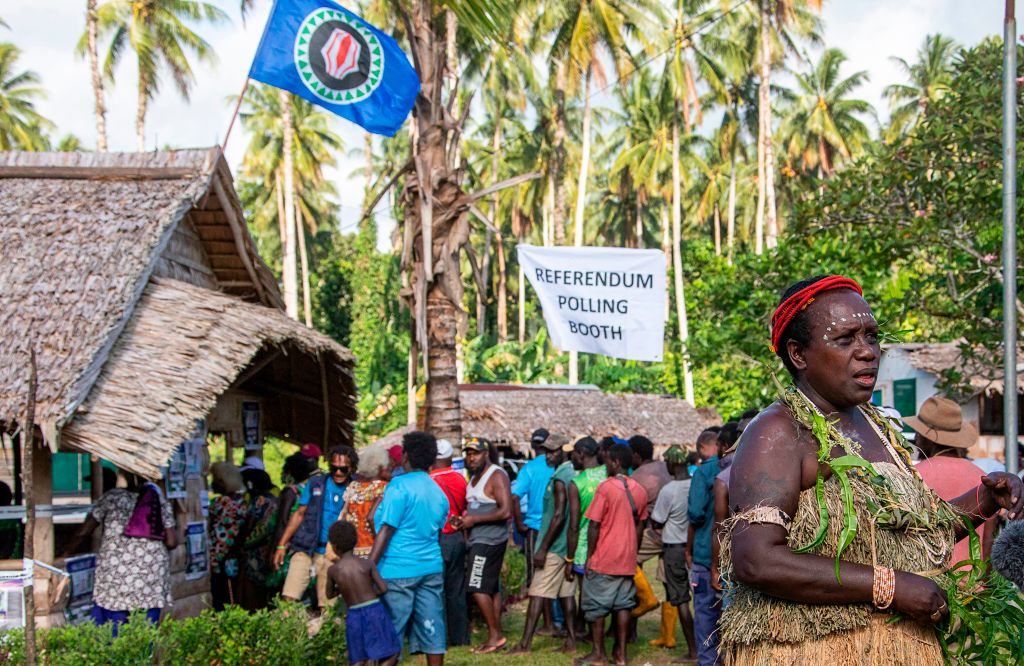 Print This Post
Print This Post- The Strategist - https://www.aspistrategist.org.au -
Australia’s PNG–Bougainville balance
Posted By Graeme Dobell on October 24, 2022 @ 06:00

Back in 2011 I visited Bougainville, and it is a very beautiful part of the world. There’s a lot of history in terms of Australia’s engagement here.
The answer to this is pretty simple. As a witness to the arrangements that were put in place in respect of Bougainville more than 20 years ago, our job is to support Papua New Guinea. And that’s what we’re going to do.
So our job is to support Papua New Guinea, in the decisions that it makes around what arrangements take place in the future. It is absolutely not our role to articulate views there.
Our role is to support the prime minister and the government of Papua New Guinea, in the decisions that it makes in respect of the future of Bougainville, and we stand ready to do that.
It was the Australian Government who trained and armed the Papua New Guinea Defence to wage war on the citizens of Bougainville and it was they who supplied [helicopter] gunships to wreck havoc and mayhem on Bougainville.
What we are witnessing right now is simply history repeating itself where the Australian Government throws its support behind the Government of Papua New Guinea to destabilise yet again Bougainville’s right to self-determination.
The statements by the Australian Defence Minister Richard Marles are in my view veiled threats being issued to the Government and people of Bougainville as he boasts about the military cooperation between the two countries …
We have remained passive recipients of piecemeal contributions and boomerang aid from the Australian Government but Mr Marles’ sentiments have now shown Australia’s true intentions for Bougainville.
I assure the governments of PNG and Australia that my government and my people do not take kindly to threats and we will never kowtow to neo-colonists that seek to usurp the sovereignty of Pacific island nations with their bullying tactics and intimidation.
The Deputy Prime Minister has stated that as a witness to the Bougainville Peace Agreement more than 20 years ago, Australia supports Papua New Guinea and the Bougainville Peace process. There has been no change to our long-standing policy on Bougainville. Australia’s role is to support the peace process and decisions around future arrangements which the parties have to negotiate. Australia will support whatever political settlement is agreed by the parties. It is not Australia’s role to articulate views about those arrangements.
The fact is that in the 21 years since the signing of the Bougainville Peace Agreement, and the 17 years since the creation of autonomous government, just a fraction of the powers and functions available to the Autonomous Bougainville Government have been drawn down. And to me, this represents a failing on the part of both governments.
A failure to protect the constitutional and democratic choice of the people will amount to a breakdown of the State’s legitimacy; and is a ground for Bougainville to assert its right under international law to remedial secession. In that scenario it will also allow the Autonomous Bougainville Government to take appropriate action/s, should the National Parliament fail to ratify or endorse the choice of the people for independence.
Article printed from The Strategist: https://www.aspistrategist.org.au
URL to article: https://www.aspistrategist.org.au/australias-png-bougainville-balance/
[1] visit: https://www.minister.defence.gov.au/media-releases/2022-10-12/deputy-prime-minister-visit-papua-new-guinea
[2] first five years: https://www.theguardian.com/world/commentisfree/2019/nov/21/peace-agreements-normally-fail-within-five-years-bougainville-is-a-lesson-to-us-all
[3] Bougainville Peace Agreement: https://www.abg.gov.pg/peace-agreement
[4] greatest challenge: https://www.rnz.co.nz/international/pacific-news/449067/bougainville-independence-is-biggest-issue-facing-png-pm
[5] settle for anything less: https://www.usip.org/publications/2022/08/next-five-years-are-crucial-bougainvilles-independence-bid
[6] ‘family’ call: https://www.minister.defence.gov.au/transcripts/2022-10-13/joint-press-conference-papua-new-guinea-parliament-house-port-moresby
[7] single biggest aid project: https://www.minister.defence.gov.au/speeches/2022-10-13/opening-angau-memorial-hospital
[8] Australia backs PNG on Bougainville: https://postcourier.com.pg/aust-backs-png-on-bville/
[9] veiled threats: https://abg.gov.pg/index.php/news/read/president-hon-ishmael-toroama-angry-at-australia-deputy-prime-minister
[10] Anthony Regan: https://researchprofiles.anu.edu.au/en/persons/anthony-regan
[11] ‘non-binding’ referendum: https://dpa.bellschool.anu.edu.au/sites/default/files/publications/attachments/2019-09/the_bougainville_referendum_low_res_1.pdf
[12] 2019 referendum: https://bougainville-referendum.org/
[13] 97.7%: https://www.ifes.org/news/bougainville-referendum-results-announced
[14] roadmap: http://www.pmnec.gov.pg/index.php/secretariats/pm-media-statements/474-national-government-and-abg-endorse-era-kone-covenant
[15] Satish Chand: https://research.unsw.edu.au/people/professor-satish-chand
[16] fiscal self-reliance: https://www.abg.gov.pg/uploads/documents/Financing_for_fiscal_autonomy-_Fiscal_Self-reliance_in_Bougainville_.pdf
[17] increasing revenues: https://mail.google.com/mail/u/0/#inbox/WhctKKXgrQPbVrbSrxXPVDPZLWKRLNXHWnFxBwWtNsVWWWbxxBvLsFvbGtjCDSjwzlTHFBb?projector=1&messagePartId=0.1